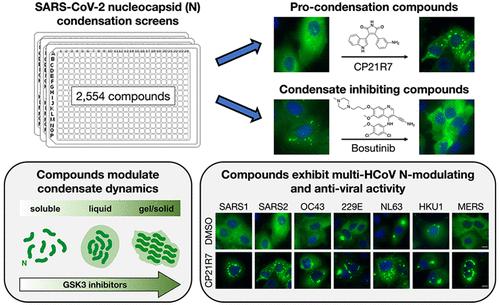当前位置:
X-MOL 学术
›
ACS Chem. Biol.
›
论文详情
Our official English website, www.x-mol.net, welcomes your
feedback! (Note: you will need to create a separate account there.)
Screen for Modulation of Nucleocapsid Protein Condensation Identifies Small Molecules with Anti-Coronavirus Activity
ACS Chemical Biology ( IF 3.5 ) Pub Date : 2023-02-16 , DOI: 10.1021/acschembio.2c00908
Rui Tong Quek 1, 2 , Kierra S Hardy 1, 2 , Stephen G Walker 3 , Dan T Nguyen 1, 2 , Taciani de Almeida Magalhães 4 , Adrian Salic 4 , Sujatha M Gopalakrishnan 3 , Pamela A Silver 1, 2 , Timothy J Mitchison 1
ACS Chemical Biology ( IF 3.5 ) Pub Date : 2023-02-16 , DOI: 10.1021/acschembio.2c00908
Rui Tong Quek 1, 2 , Kierra S Hardy 1, 2 , Stephen G Walker 3 , Dan T Nguyen 1, 2 , Taciani de Almeida Magalhães 4 , Adrian Salic 4 , Sujatha M Gopalakrishnan 3 , Pamela A Silver 1, 2 , Timothy J Mitchison 1
Affiliation

|
Biomolecular condensates formed by liquid–liquid phase separation have been implicated in multiple diseases. Modulation of condensate dynamics by small molecules has therapeutic potential, but so far, few condensate modulators have been disclosed. The SARS-CoV-2 nucleocapsid (N) protein forms phase-separated condensates that are hypothesized to play critical roles in viral replication, transcription, and packaging, suggesting that N condensation modulators might have anti-coronavirus activity across multiple strains and species. Here, we show that N proteins from all seven human coronaviruses (HCoVs) vary in their tendency to undergo phase separation when expressed in human lung epithelial cells. We developed a cell-based high-content screening platform and identified small molecules that both promote and inhibit condensation of SARS-CoV-2 N. Interestingly, these host-targeted small molecules exhibited condensate-modulatory effects across all HCoV Ns. Some have also been reported to exhibit antiviral activity against SARS-CoV-2, HCoV-OC43, and HCoV-229E viral infections in cell culture. Our work reveals that the assembly dynamics of N condensates can be regulated by small molecules with therapeutic potential. Our approach allows for screening based on viral genome sequences alone and might enable rapid paths to drug discovery with value for confronting future pandemics.
中文翻译:

核衣壳蛋白缩合调节筛选鉴定具有抗冠状病毒活性的小分子
液-液相分离形成的生物分子缩合物与多种疾病有关。小分子对凝聚态动力学的调节具有治疗潜力,但迄今为止,很少有凝聚态调节剂被公开。SARS-CoV-2 核衣壳 (N) 蛋白形成相分离的缩合物,推测其在病毒复制、转录和包装中发挥关键作用,这表明 N 缩合调节剂可能在多个毒株和物种中具有抗冠状病毒活性。在这里,我们表明,来自所有七种人类冠状病毒(HCoV)的 N 蛋白在人肺上皮细胞中表达时发生相分离的倾向各不相同。我们开发了一个基于细胞的高内涵筛选平台,并鉴定了能够促进和抑制 SARS-CoV-2 N 凝结的小分子。有趣的是,这些针对宿主的小分子对所有 HCoV N 都表现出凝结调节作用。据报道,有些在细胞培养物中对 SARS-CoV-2、HCoV-OC43 和 HCoV-229E 病毒感染表现出抗病毒活性。我们的工作表明,N 缩合物的组装动力学可以通过具有治疗潜力的小分子来调节。我们的方法允许仅根据病毒基因组序列进行筛选,并可能实现快速发现药物的途径,对于应对未来的流行病具有价值。
更新日期:2023-02-16
中文翻译:

核衣壳蛋白缩合调节筛选鉴定具有抗冠状病毒活性的小分子
液-液相分离形成的生物分子缩合物与多种疾病有关。小分子对凝聚态动力学的调节具有治疗潜力,但迄今为止,很少有凝聚态调节剂被公开。SARS-CoV-2 核衣壳 (N) 蛋白形成相分离的缩合物,推测其在病毒复制、转录和包装中发挥关键作用,这表明 N 缩合调节剂可能在多个毒株和物种中具有抗冠状病毒活性。在这里,我们表明,来自所有七种人类冠状病毒(HCoV)的 N 蛋白在人肺上皮细胞中表达时发生相分离的倾向各不相同。我们开发了一个基于细胞的高内涵筛选平台,并鉴定了能够促进和抑制 SARS-CoV-2 N 凝结的小分子。有趣的是,这些针对宿主的小分子对所有 HCoV N 都表现出凝结调节作用。据报道,有些在细胞培养物中对 SARS-CoV-2、HCoV-OC43 和 HCoV-229E 病毒感染表现出抗病毒活性。我们的工作表明,N 缩合物的组装动力学可以通过具有治疗潜力的小分子来调节。我们的方法允许仅根据病毒基因组序列进行筛选,并可能实现快速发现药物的途径,对于应对未来的流行病具有价值。

































 京公网安备 11010802027423号
京公网安备 11010802027423号